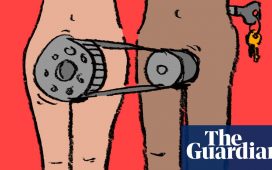I’m 26 years old, and have been having a really hard time in the past few months due to a breakup I brought upon myself.
Last year I started a long-distance relationship with a girl. I loved her, but felt I was constantly struggling with my emotions and honesty due to my insecurity. This caused me to be needy, desperate and always seeking some sort of validation from her, and we had a few breaks because of this.
We officially became a couple after chatting online for about four months, but broke up in the summer, because of my escalating issues.
This resulted in me using dating apps to try to find a one-night-stand to get my mind off things. I felt that she was the love of my life and I was willing to settle down with her.
I keep telling myself she suffered a lot because of my decisions and now wants nothing to do with me, but I’m feeling very miserable. I don’t know what to do. All I want is for her to forgive me and give me one last chance to prove I’m capable of being a better man and boyfriend.
Sign up to our Inside Saturday newsletter for an exclusive behind-the-scenes look at the making of the magazine’s biggest features, as well as a curated list of our weekly highlights.
I am sorry you feel so miserable: it’s horrible to feel you’ve messed up, but if you can look beyond what happened for a moment, to why it happened, it will help you learn more about yourself, so you won’t repeat your mistakes.
This girl has made it clear she doesn’t want “anything more to do with you”, so you must respect that. The fact that you want her to forgive you is out of your control. Taking responsibility for one’s actions can be tough, but essential to become a better person. You realise your insecurities and need for validation, and that’s a positive.
I consulted psychotherapist Tamara Sears (psychotherapy.org.uk), who wondered: “If you are constantly going to someone else [here, your ex] for validation, how much validation would be enough? Is there an end point or is it a bottomless well? That’s quite an ask of someone.”
What was your early life like? Growing up, what made you feel secure and validated and, indeed, did you ever get that? Sears asked:“Insecurity and anxiety,” explained Sears, “is a really useful alert to something you need to be aware of. Were there issues in the relationship that triggered these insecurities?”
I know this relationship felt perfect in hindsight, but in reality it wasn’t giving you what you needed. It’s interesting that you broke up after you felt more committed. This again can be a sign of fearing loss: you want the relationship, but the fear of it going wrong is enough to make you end it – or sabotage it so the other person ends it.
“I wondered,” said Sears, “what it would mean for you to prove you’re a ‘better man’. Would it change the guilt? Guilt and shame are useful. You can’t ignore them; they’re there to remind us what not to do.”
The problem with guilt and shame is when they don’t teach us but hold us back. You need to talk about yours, as you have started to do here, with someone you trust, (a friend, a counsellor) so you can start to forgive yourself and fold this back into your life. And move on. Other people’s forgiveness isn’t as powerful as us forgiving ourselves.
In your next relationship, Sears recommended being more honest with your partner. There’s no shame in saying you need reassurance or to be shown a bit of TLC. Maybe not on a first date, but knowing what you need and asking for it – as long as it’s reasonable and not expecting your partner to fill the “bottomless well” Sears talked about, is healthy and in itself validating.
Sears asked why you would want to be with someone you didn’t trust? That’s a useful question to ask yourself, maybe it feels familiar, which isn’t the same as being good for you. A period of introspection may be appropriate. Time spent looking at yourself will pay dividends and help you discover who you are. Once you know that, a partner becomes a bonus, not a necessity.
Every week Annalisa Barbieri addresses a family-related problem sent in by a reader. If you would like advice from Annalisa on a family matter, please send your problem to ask.annalisa@theguardian.com. Annalisa regrets she cannot enter into personal correspondence. Submissions are subject to our terms and conditions: see gu.com/letters-terms.
Conversations With Annalisa Barbieri, a new podcast series, is available here.
Comments on this piece are premoderated to ensure the discussion remains on the topics raised by the article. Please be aware that there may be a short delay in comments appearing on the site.
Conversations With Annalisa Barbieri, a new podcast series, is available here














